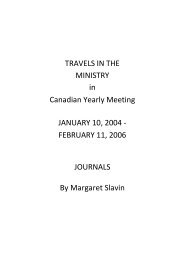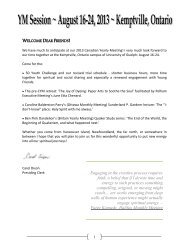Download pdf - Canadian Yearly Meeting
Download pdf - Canadian Yearly Meeting
Download pdf - Canadian Yearly Meeting
Create successful ePaper yourself
Turn your PDF publications into a flip-book with our unique Google optimized e-Paper software.
Book Review: by Eric SchillerGod is not Great: How Religion Poisons Everything,Christopher Hitchens.This is the first book that I have read by an atheistsince I read Bertrand Russell’s Why I’m not a Christianin seminary. It is one of a new breed of books byoutspoken atheists. It is probably not one of the mostbalanced. One should probably look at others such asRichard Dawkins’ The God Delusion or Sam Harris TheEnd of Faith. In any event, I think that to read someopposing views from time to time can be stimulatingand maybe even useful.This is not a book for the faint of heart (or thefaint of faith), but if you want your faith challengedand possibly even strengthened, then give it a go.Hitchens has done exhaustive work on most of themodern religions. He has catalogued, in distressingdetail, many of the foibles and outright cruelties oforganized religion over the years. They are indeedmultitudinous.One should not take this as an objective andbalanced treatment of religion. The book is disturbinglybiased. Hitchens makes constant appeals to scienceand reason, yet he claims that whereas religion ishopelessly biased and distorts the truth, his point ofview is objective.Let us dwell on the very title of the book: God isnot Great: How Religion Poisons Everything. Considerthe word Everything. This simply means that nogood can come out of religion, because it poisonsEverything. This is a bombastic statement and thebook is full of such bombast. As a result of the claim inthe title of the book, Hitchens is at his most defensivewhen he encounters examples that may show thatreligion does not, in fact, ‘poison everything’. Whendealing with people like Martin Luther King, Gandhi,Bonhoeffer and some more credible religious groups.Hitchens simply decides to downplay or minimizetheir contributions. When examples are especiallybothersome, he seems to ignore them all together. Forexample, Bishop Tutu and Jimmy Carter.Hitchens is attacking religion. Religion is the formtaken when people organize their spiritual lives withina structure. The book might have taken a different tackif he had decided to come to grips with spirituality.Instead, Hitchens repeatedly brings up the crudest,weirdest and most outrageous examples of religiousbehaviour. Granted, there are many examples todraw from. Hitchens, however, fails to acknowledge16the more lofty and wholesome currents of religiousthought and action.Hitchens cannot seem to see the evolution ofreligious thought. Religion can’t be getting any betterbecause, according to him, it is inherently false andmust therefore die, or perhaps get even worse. Moresympathetic souls have seen a growing trend fromancient religious magic – where people believedthey could influence the gods by ritual acts – to agrander view of a religion of awe and mystery, to anemerging view of universal ethics as espoused in a newunderstanding of compassion to all, and a view ofuniversal human rights. It is true that remnants of theold warlike, nationalistic, tribal religions remain, andstill seem to be alive and well. In the end, it is a matterof where you to want put your emphasis and how youwant to interpret the world.Hitchens displays little understanding of the roleof mythology. He often takes religious stories literallyand ridicules them. Yet, myth making is one of themost universal traits of mankind. It has ancient roots.It is still a feature of organized human behaviour.Historically, secular regimes do not seem to havefared any better than religious regimes. For example,Hitler’s Nazi Germany and Stalin’s Communist Russiawere not religious but were capable of horrendousacts. Religious regimes have been capable of terriblebehaviors but so have secular regimes. What wehave here is a universal human condition. We willsomehow have to learn to control outrageous humanbehaviours which lead to terrible oppression of others.Sometimes this destructive human behaviour can beexacerbated and inflamed by religion, but sometimesreligious impulses can bring out the best in humanconsciousness. I think the holy experiment of thefounding of the state of Pennsylvania by the Quakersis an example of the latter.I find it useful to distinguish between atheists whoare absolutely sure that there is no God, and agnosticswho simply claim to have no absolute certainty on thisquestion. In reading Christopher Hitchens, I have meta religious atheist. He is dead sure that he is right andmocks others who hold to the idea of the divine. Ihave to admit that I would prefer conversing with anagnostic.Eric SchillerOttawa Monthly <strong>Meeting</strong>May 2013 - The <strong>Canadian</strong> Friend








